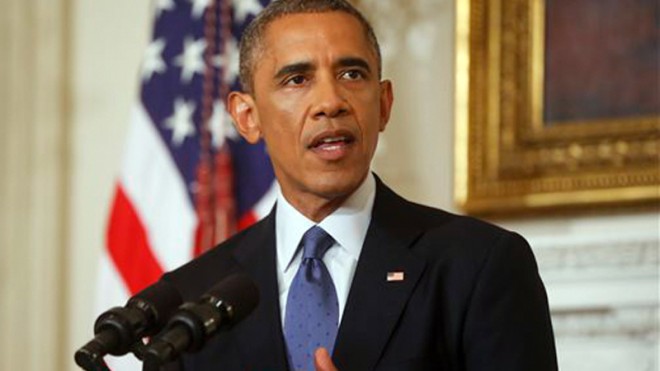WASHINGTON— Almost six years into a presidency that had inspired hope for a new era of American leadership, Barack Obama has reached a point where it will be difficult to salvage his international affairs legacy in the face of blooming crises that critics and even some supporters blame on a commander in chief they view as a feckless.
The president has taken serious battering over foreign policy, where his objective as he took office in 2009 was to undo what he saw as the mistakes of his predecessor, George W. Bush.
Two years after taking office, Obama had all U.S. troops out of Iraq. He’s on course to pull all but a vestigial American force from Afghanistan at the end of 2016, just before he leaves office.
Four months into his presidency, Obama went to Cairo to tell the Arab world he wanted a new start and understood their frustrations and anger.
In Europe, Obama was beloved even before his election for his promise of inclusiveness and collegiality with allies that had been dismissed by Bush’s Defense Secretary Donald Rumsfeld as “old Europe” for their refusal to sign on to the invasion and occupation of Iraq.
Obama called for a “reset” in relations with Russia which were on a precipitous downward slide even before the Ukraine crisis.
He boldly sent US Special Forces deep into Pakistan to kill Osama bin Laden.
But with less than three years left of his presidency, much of what he planned didn’t work out, and events over this summer and reaching further back have seen potential troubles ripen into crises.
What happened?
“Part of it is his own natural risk aversion, part of it is the cruel and unforgiving nature of the world. And part is the fact that he was dealt an extremely complicated hand,” said Aaron Miller, a former Middle East adviser to Republican and Democrat secretaries of state and a scholar at the Wilson Center.
Another factor has been nearly blanket opposition from Republicans in Congress, particularly after the opposition party took control of the House of Representatives in 2010. He was blocked from his promise of closing the Guantanamo Bay prison for terrorists, and could not win backing for legislation to place America on a bold path to deal with climate change.
The Arab Spring uprisings in the Middle East mostly turned into extended, bloody and brutal struggles for power.
In the Syrian civil war, where Obama repeatedly said Bashar al-Assad must step down, the administration stepped back from threatened airstrikes after he used chemical weapons.
In the meantime, the fearsome Islamic State terror group took power in the north of the country and is winning the fight against the moderate Free Syrian Army, which sought to oust Assad. Worse still, the brutal organization has swept into Iraq and occupied much of the northwest of the country. With the group preying on ethnic groups and Shiite Muslim Arabs in Iraq and threatening to take control of the Kurdish region, Obama finally authorized U.S. airstrikes in Iraq against the Islamic State. As he made clear Thursday, however, he remains unready to use the American military against the group in Syria.
Compounding the problem in Iraq: The US left Iraq with former Prime Minister Nouri al-Maliki, an intensely sectarian Shiite Muslim, in charge. He had shut minority Sunni Muslims out of power, breeding discontent and creating fertile ground for Islamic State fighters, who also are Sunni. When the group swept into Iraq earlier this summer, the American trained and armed Iraqi army fled, leaving behind American weapons and armored vehicles for the invaders. But al-Maliki did step down under heavy US pressure.
The narrative of Obama’s foreign policy legacy “has been thrown into disarray,” said James Goldgeier, dean of the American University School of International Service. “Now you have to go back and deal with the emergence of what is becoming an incredibly dangerous situation in Iraq.” And, he said, there is great uncertainty about the US departure from Afghanistan, where two presidential candidates still battle over the election outcome.
Then there is Russia’s meddling in Ukraine, where a new pro-Western government is fighting to put down a pro-Moscow rebellion in the east of the country. Obama and the European Union, under extreme pressure from the White House, have imposed a series of sanctions against Russia and President Vladimir Putin. While that has damaged the Russian economy, it has not convinced Putin to end his military assistance to the rebels. Most recently the United States and NATO have declared Moscow has about 1,000 new soldiers and new heavy armor in Ukraine.
On Thursday, Obama said again that the United States would not become involved militarily in Ukraine.
The one foreign policy bright spot is negotiations with Iran aimed at ensuring it will not use its nuclear program to build an atomic weapon. After failing to reach a deal by the summer deadline, the talks were extended.
Miller, of the Wilson Center, said Obama will certainly be remembered for tracking down and killing bin Laden. He called that a “heroic act.” But the emergence of the Islamic state group “will diminish that somewhat.”
Miller said the nature of today’s world has closed down the possibility of future heroic acts for Obama or any president to come. “So I think it’s game over here in terms of his image.”
RELATED STORIES
Obama cautions against using force to solve crises
Anti-Obama protesters clash with police in Manila
